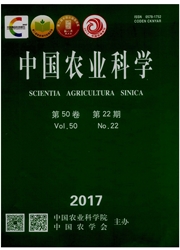

 中文摘要:
中文摘要:
【目的】研究与探索不同农作管理措施对东北农业土壤有机碳的影响,为东北地区高产高效低碳农业及可持续发展提供科学依据。【方法】不同农作管理措施能够影响土壤有机碳(soil organic carbon,SOC)的未来变化,该研究基于东北地区4个长期定位试验站点(黑龙江省哈尔滨站点、吉林省公主岭站点、吉林省德惠站点、辽宁省沈阳站点)的试验数据,用站点的实测作物产量和SOC双标准对DAYCENT模型进行校验。DAYCENT模型调整的相关参数包括作物参数、耕作方式参数、施肥参数、收获参数和有机肥参数等,在对所选试验站点的长期定位试验结果校验后,利用已校验的各项参数,对模型模拟情况进行验证,发现模型模拟值与实测值吻合良好,表明DAYCENT模型适用于这4个地区的作物产量和SOC模拟,可以较好地模拟SOC的动态变化。进而研究在未来气候变化情景下(representative concentration pathway 4.5,RCP 4.5),用校验了的DAYCENT模型对这4个站点在4种不同管理情景(施用化肥、增施有机肥、秸秆还田、免耕)下的SOC变化情况进行模拟。【结果】模拟结果显示,对于哈尔滨站点,采用有机肥和氮磷钾化肥配施处理(MNPK)在短时间内使SOC升高较快,而从长远来看,配施低量有机肥与单施用化肥对SOC增加的斜率基本一致,但由于化肥和有机肥配施(MNPK)处理的初始SOC含量高,其SOC未来含量的绝对值也比较高;对于德惠站点,虽然短时间内,免耕处理SOC低于常耕处理,但长期看来,免耕更有利于增加SOC,其SOC涨幅逐渐高于常耕处理,40年间相对增加了11.88%;公主岭站点有机肥氮磷钾化肥配施和氮磷钾化肥结合秸秆还田措施较单施化肥可显著提高农田SOC;沈阳站点的未来有机碳模拟发现,在单施化肥情况下,未来的42年内SOC呈略微下降趋势,相对降低2.83%,从长远看来,单施化肥并不能使该地区SOC增加,?
 英文摘要:
英文摘要:
【Objective】The effects of different agricultural management practices on soil organic carbon in Northeast China were studied in order to provide a scientific basis for sustainable development and low carbon agriculture aiming at high yield, high nutrient efficient and low pollution in Northeast area. 【Method】Different agricultural management practices can affect the future changes of soil organic carbon(SOC). This study calibrated the DAYCENT model by using observed crop yield and SOC standards, which based on the collected data of four long-term experiment sites in Northeast China(Harbin Heilongjiang, Gongzhuling Jilin, Dehui Jilin, Shenyang Liaoning). DAYCENT model parameters need to be adjusted, which include crop parameters, tillage parameters, fertilization parameters, harvest parameters, organic fertilizer parameters and so on, and then this study validated the model by using adjusted parameters after calibrating. The simulated and measured values were fitted well, which indicated that the DAYCENT model is applicable to simulation of crop yields and SOC of these four areas and can simulate the dynamic changes of SOC well. The calibrated and validated model was used to simulate the future changes of SOC under four different management practices(fertilizer application, organic manure augment, straw incorporation, and no-tillage) at the future climate change scenario(representative concentration pathway 4.5, RCP 4.5). 【Result】 The simulation results showed that SOC will be increased rapidly in a short period of time by using combined application of organic manure and chemical fertilizer(MNPK) at Harbin site. Although the increasing slope of SOC for lower rate of manure combined with chemical fertilizers and chemical fertilizer showed a consistency in a long period of time, but the absolute value of future SOC content will be higher for MNPK compared to NPK due to its higher initial SOC content. The SOC of no-tillage treatment showed lower than conventional tillage in a short per
 同期刊论文项目
同期刊论文项目
 同项目期刊论文
同项目期刊论文
 期刊信息
期刊信息
